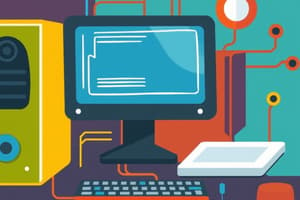Podcast
Questions and Answers
?
?
- (correct)
?
?
- (correct)
- (correct)
?
?
- (correct)
- (correct)
?
?
?
?
?
?
Study Notes
The Computer: A Comprehensive Overview of Software, Hardware, Networking, Cybersecurity, and Programming
The computer has become an intricate element of our daily lives, from work to entertainment. To fully understand its capabilities and limitations, we must delve into the various aspects that make up this complex machine. This overview will explore the software, hardware, networking, cybersecurity, and programming components of the computer.
Software
Software is the collection of instructions that tell a computer how to perform tasks. These programs can range from operating systems like Windows or Linux to applications such as web browsers, text editors, and productivity tools. The software component allows for customization and automation of computing tasks, making our interaction with computers smoother and more efficient.
Hardware
Hardware refers to the physical components of a computer system. These include the central processing unit (CPU), memory, storage devices, input and output peripherals, and networking equipment. Hardware provides the foundation for all computational activities by performing computations, storing information, and facilitating communication between different parts of the computer system.
Networking
Networking enables computers to communicate and share resources over long distances. This involves the use of protocols such as TCP/IP, which establish common standards for transmitting data across networks. Computers connected through networking may also participate in distributed computing projects, allowing them to collaborate on large-scale tasks.
Cybersecurity
Cybersecurity focuses on protecting electronic systems against unauthorized access or damage. Threats range from hackers attempting to exploit vulnerabilities in software or hardware to malicious code that infiltrates computer systems. Effective cybersecurity measures involve a combination of robust hardware design, secure software development practices, and user education about safe online behavior.
Programming
Programming, as the core discipline behind computing machines, involves writing algorithms that instruct computers to perform specific operations. Through structured programming languages like Java or Python, developers create software that runs on diverse platforms. Programming also plays a crucial role in understanding and manipulating hardware functionality, enabling customized solutions for niche problems.
In conclusion, the computer is a multifaceted device that depends on a balance among its software, hardware, networking, cybersecurity, and programming components. Each element contributes to the overall performance and security of the system, highlighting the interconnected nature of these subtopics.
Studying That Suits You
Use AI to generate personalized quizzes and flashcards to suit your learning preferences.
Description
Explore the intricate elements of a computer, including software, hardware, networking, cybersecurity, and programming. Learn how these components work together to define the capabilities and limitations of the modern computing machine.




